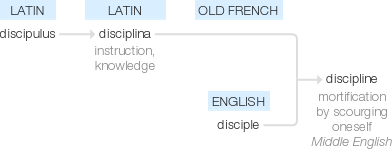Discipline
Middle English (in the sense ‘mortification by scourging oneself’): via Old French from Latin disciplina ‘instruction, knowledge’, from discipulus (see disciple).
wiktionary
From Middle English[Term?], from Anglo-Norman, from Old French descipline, from Latin disciplina(“instruction”), from discipulus(“pupil”), from discere(“to learn”), from Proto-Indo-European *dek-(“(cause to) accept”).
etymonline
discipline (n.)
c. 1200, "penitential chastisement; punishment for the sake of correction," from Old French descepline "discipline, physical punishment; teaching; suffering; martyrdom" (11c., Modern French discipline) and directly from Latin disciplina "instruction given, teaching, learning, knowledge," also "object of instruction, knowledge, science, military discipline," from discipulus "pupil, student, follower" (see disciple (n.)).
The Latin word is glossed in Old English by þeodscipe. The meaning "treatment that corrects or punishes" is from the notion of "order necessary for instruction."
Meaning "branch of instruction or education" is first recorded late 14c. Meaning "system of rules and regulations" is from mid-14c. Meaning "military training" is from late 15c., via the notion of "training to follow orders and act in accordance with rules;" that of "orderly conduct as a result of training" is from c. 1500. Sense of "system by which the practice of a church is regulated, laws which bind the subjects of a church in their conduct" is from 1570s.
discipline (v.)
c. 1300, disciplinen, "to subject to (penitential) discipline, correct, chastise, punish," from Old French descepliner and directly from Medieval Latin disciplinare, from Latin disciplina (see discipline (n.)). Meaning "instruct, educate, train" is from late 14c. Related: Disciplined; disciplines; disciplining.
